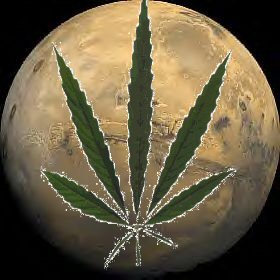Pop culture has, metaphorically speaking, allied the concept of midnight tokers and outer space. Truth is they have been mutually exclusive. Astronauts take drug tests like any other federal employee. And do you think right now NASA will risk the PR damage by having some billionaire waving millions of dollars in their face for a ride to the ISS, only for the press to grab hold of the fact that those same " space tourists" were busted as teenagers for possesion?
That fact alone would disqualify them and every other citizen for a seat on a government rocket. It may not disqualify them for a seat on privatized space transportation that the so called New Space entrepeneurs are developing. So just like commerical air travel, the bong hits you did last night doesn't mean you can't catch your flight today.
However, in all the ballyhoo about sub-orbital space flight made by these entrepeneurs, as far as I know, nobody has ever addessed "Vomit Comet Syndrome".
It's a well documented fact of life in the space biz that amost 40% of all people when in a microgravity environment can get extremely nauseated if not violently ill. And quite frankly, if I were a well-heeled potential space tourist, I sure wouldn't want to think I'll spend experiencing my lifetime dream and up to US $ 260,000 a seat up-chucking into a bag.
In 1989, NASA first tested the use of Promethazine HCl injections to treat the symptoms of space sickness. At the time, it was a great choice. Promethazine [ Phenergan (TM)] is not only an anti-nausea agent, but it also acts as an antihistamine. Body fluids pool in microgravity, and at least for the first 72 hours, practically everyone feels as if they have a head cold. The anti-histamine would help relieve the sinus pressure.
Treatment begins prophyllactically with one 25mg injection approx. one hour prior to flight. Should symptomatic treatment become necessary during the flight, the suffering crewmember is given 1 x 25mg injection twice daily.
Promethazine has been their number one choice of treatment since.
As a space sickness treatment for space tourists, however, is another story.
In the following 18 years since it's introduction to the shuttle's medicine cabinet, astronauts report consistent side effects such as drowsiness, mental impairment and negative moodiness.
Furhter, according to the 2006 Physicians Desk Reference, this medication is contra-indicated for use by persons with underlying cardiovascular conditions. it is als reported as not being "tolerated well" in young children, up to and incluing suppression of respiratory function in toddlers.
I would love to go with my kids on a space trip, but the thought of one or more of them having a life threatening drug reaction on top of the possiblity of having them aspirate on their own vomit in zero-g is 100 percent unacceptible!
And consider the aging baby boomers, full of Space Age nostalgia and money to indulge fulfilling it, only to launch, get sick & being treated by something that may exacerbate an unknown heart condition.
NASA and the New Space entrepeneurs may not have the solution right now, but it's possible medical marijuana users and their caregivers may have. The use of low/no-THC cannabis ( specifically a high cannabinoid type ) for treating the nauseating after-effects of chemotherapy, as well for those persons suffering with HIV/AIDS, could be a well-tolerated treatment.
So it's quite possible that thanks to those patients, caregivers, compassion club volunteers & the med-mar growers risking so much for just wanting to improve quality of life, a significant roadblock to the permanent migration of humanity to Mars & beyond may be solved.
And for that, the very least that we as a people can give them, is the complete and unconditional decrimilization & legalization of cannabis use for medicinal purposes.
Sunday, April 22, 2007
Cannabis as treatment for Space Sickness
Subscribe to:
Post Comments (Atom)




No comments:
Post a Comment